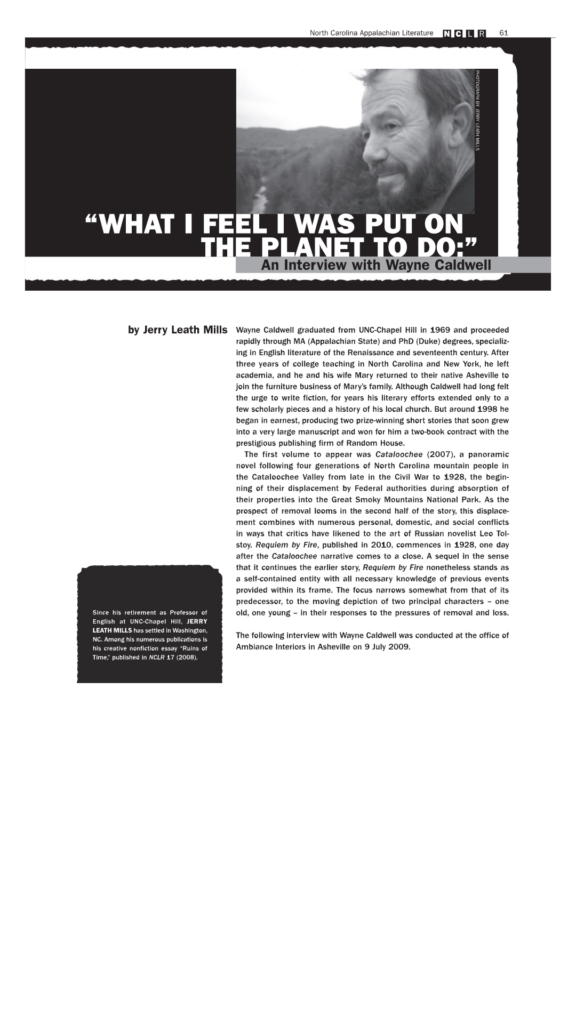Friday from the Archives: “What I Feel I Was Put On The Planet To Do:” An Interview with Wayne Caldwell by Jerry Leath Mills from NCLR Issue 19 (2010)
We’re excited to see so many writers, artists, and readers getting their copies of NCLR 32 featuring “Native American Literature of North Carolina.” Between our two online issues in 2023 and the print issue, we are proud to finally highlight an important voice in our state’s rich literary culture.
One of the featured writers, Annette Saunooke Clapsaddle, mentions often how she finds herself straddling between both her Cherokee heritage and her Appalachian culture. She mentions in her opening essay, “Postcards from Cherokee” how “[e]very time I look at our mountains at home, I cannot help but imagine what they would look like if industries came in and sliced away their summits of gleaned their slopes of trees.” And this is exactly why we also have the “NC Flashbacks” section, because so often our writers inadvertently speak to each other through time.
Our 2010 issue featured “North Carolina Appalachian Literature.” Interviewer Jerry Leath Mills asks Asheville writer Wayne Caldwell, “Near the end of Cataloochee and all through Requiem you find a situation with the [National] park’s creation in which ninety percent of the nation will look at it as an enormous benefit, and maybe ten percent, including most of the locals, will see it as a big land grab. How does a person reconcile what he may even be persuaded to see as an ultimately good thing with a thing that has to be taken away from him personally?”
Caldwell responds, “I don’t think the people in my novels have enough distance from what’s going on to recognize that in the future, it will be a good thing. The park was created twelve or thirteen years before I was born, and with my perspective now I can look around and see what we’ve done to the mountaintops outside the park, building condominiums, tearing down the forest, and so on, and then I can go to Cataloochee and I’m peaceful. I have to think that this was a very good thing for the government to do.” Caldwell also references other writers’ takes on forced individual removal for public utility: Charles Frazier on Cherokee and Ron Rash on the TVA, both of which Clapsaddle also discusses. Circular.
Mills and Caldwell talk not only about his books and family lore which inspired the stories, but also about Caldwell’s personal history and circuitous path toward writing. Mills asks, “You started writing, by some standards, a bit late in life. Were there any specific happenings that made you say, “Now I’ve got to write”?”
Caldwell replies, “I’d been wanting to write some serious fiction ever since high school. It’s a powerful thing to live in Asheville and read Look Homeward, Angel at the age of fourteen. But due to one thing or another, mostly related to career, I never did write fiction until I turned fifty and realized that if I was ever going to do it, it was time to start.”
Caldwell’s latest publication is a book of poetry and his second novel Requiem by Fire is once again available thanks to Leaning Chair Press, the publishing arm of Asheville’s Malaprops Bookstore.
Read the whole article via Proquest or order the 2010 issue for your collection.
